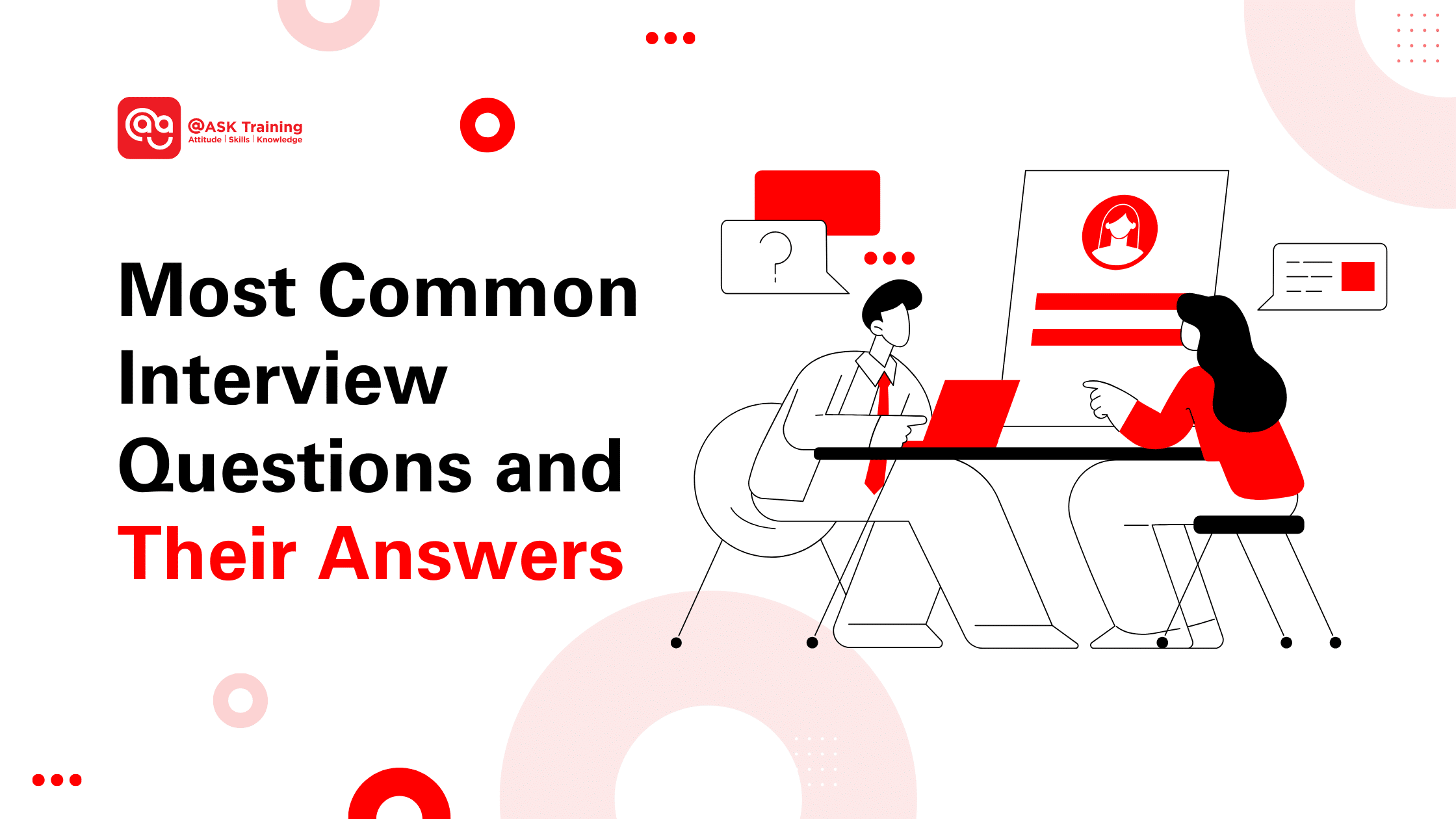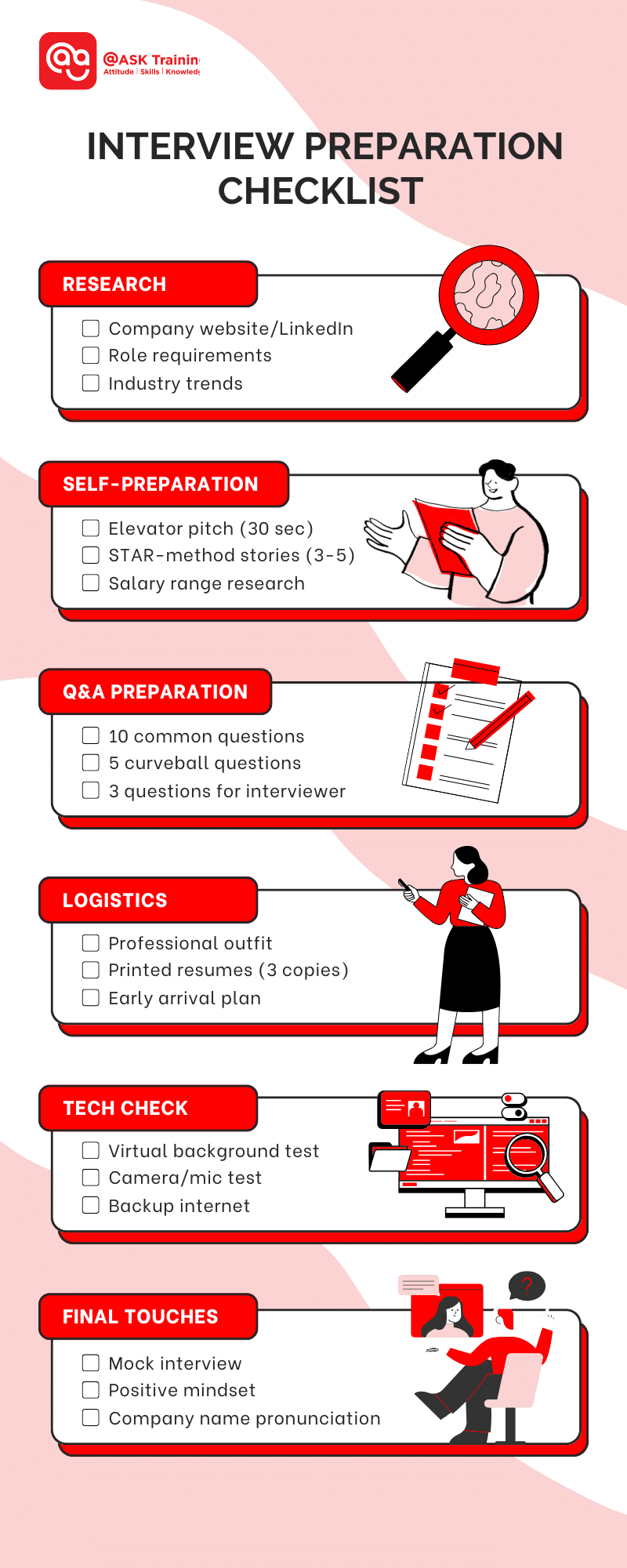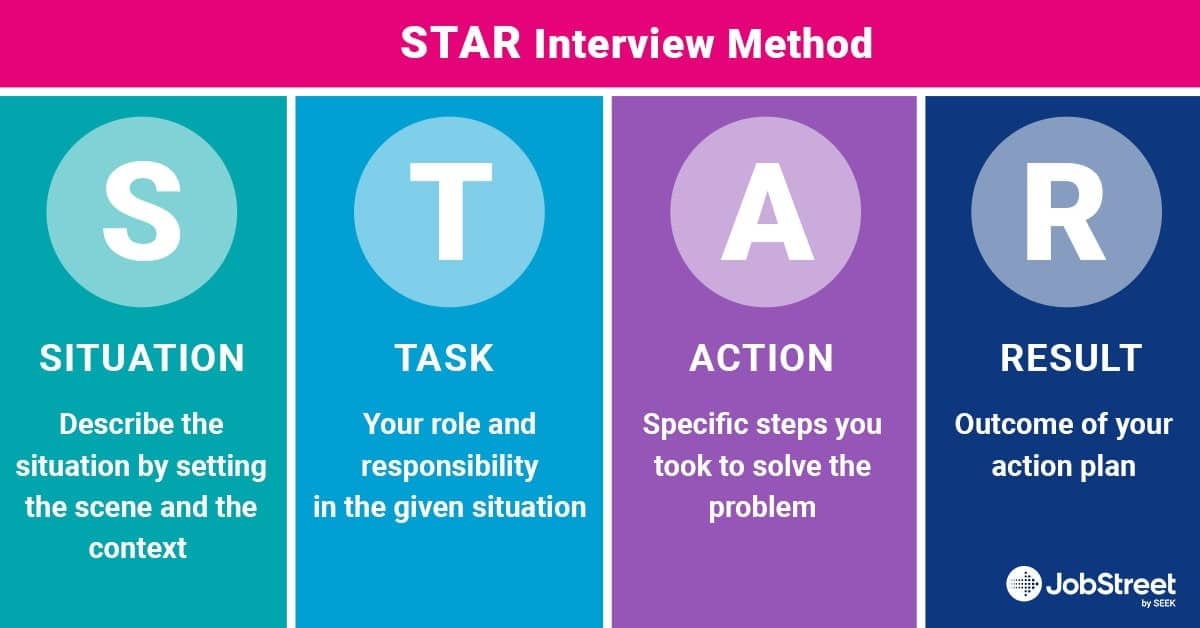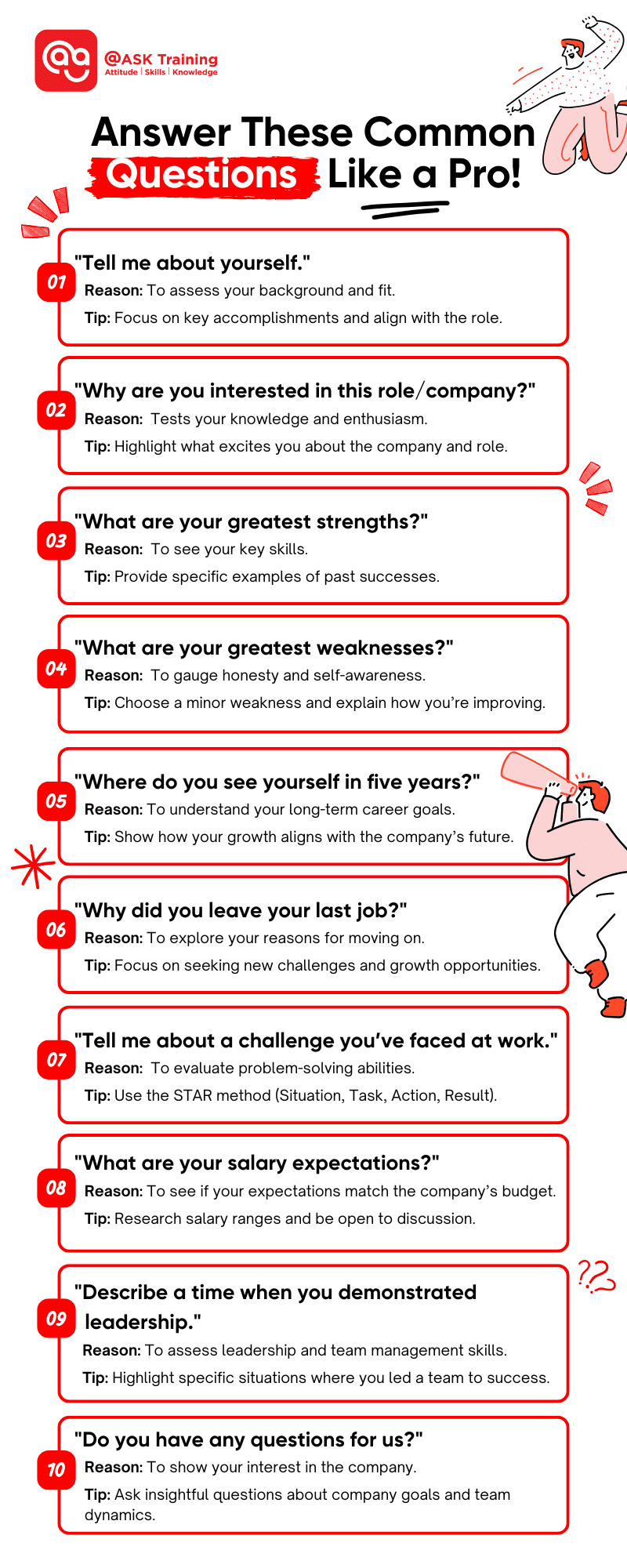
Picture yourself at a magic show, knowing exactly how each trick is performed. You’d be able to appreciate the skill and artistry even more. The same goes for job interviews.
Job interviews can feel like a high-stakes performance, but with the right preparation, you can turn them into opportunities to shine.
In this guide, we’ll walk you through the most common and uncommon interview questions, provide strategic answers, and share tips to help you land your dream job.
Let’s dive in.
The Importance of Understanding Common Interview Questions
Understanding common and uncommon interview questions and answers can give you a significant edge in job interview preparation. Their underlying purpose is like having a backstage pass—it gives you a head start to the process and equips you with the insight to perform your best.
By knowing what interviewers are looking for, you can tailor your answers to highlight your strengths and show that you’re the perfect fit for the role.
Overview of Interview Preparation
Imagine you’re about to climb Mount Everest without any gear—sounds like a recipe for disaster, right? Preparing for a job interview without doing your homework is pretty much the same.
Let’s set you up with all the right tools to conquer that interview challenge! Here are a few tips to prepare for an interview:
Step 1: Research the Company, Role and Industry
Researching the company, role, and industry is like getting a treasure map before going on a quest.
It helps you understand the company’s culture, values, and goals so you can align your answers with their expectations. Use company websites, Glassdoor, and LinkedIn resources to gather valuable insights.
Pro Tip: Use the company’s About Us page and Careers section to understand their priorities. If possible, connect with current or former employees on LinkedIn to gain insider insights.
Step 2: Conduct a Self-Assessment:
Before you can impress an interviewer, you need to know yourself well. Reflect on your skills, experiences, and career aspirations. Identify your strengths and areas for improvement.
This self-awareness will enable you to present yourself with confidence and authenticity. Try out this free self-assessment tool by SkillsFuture Singapore.
Step 3: Dress for Success:
Don’t overlook the basics! Dress appropriately for the interview, be punctual, and bring your resume, portfolio, and references. First impressions count!
Now that you understand the importance of interview preparation, let’s dive into the techniques that will help you craft compelling answers.
Techniques for Answering Interview Questions
Before we explore specific questions, it’s important to understand the techniques that will help you craft compelling answers. These strategies will ensure your responses are clear, concise, and impactful.
1. The STAR Method:
When answering behavioural interview questions, the STAR method (Situation, Task, Action, Result) provides a structured approach to ensure your answers are clear, concise, and impactful.
(Source: JobStreet)
- Situation: Describe the context within which you performed a task or faced a challenge at work.
- Task: Explain the actual task or challenge that was involved.
- Action: Detail the specific actions you took to address the task or challenge.
- Result: Share the outcomes or results of your actions, highlighting what you accomplished.
2. Authenticity and Alignment:
- Tailor your answers to reflect the company’s culture and the role’s requirements. Use keywords from the job description and highlight experiences that align with the company’s goals.
3. Communication Tips:
Eye Contact
- Maintaining eye contact shows that you’re engaged and self-assured.
Body Language
- Your body language speaks volumes. Combine this with a firm handshake, a relaxed posture, and occasional nodding to express your interest and professionalism.
- Confident body language can greatly enhance your trustworthiness and leave a positive impression.
Managing Pauses
- It’s perfectly fine to take a moment to gather your thoughts before answering a question.
- Use pauses to reflect on what you want to say and ensure your response is clear. A well-thought-out answer is always better than a quick one.
- Taking a brief pause shows that you’re thoughtful and composed under pressure.
With these elements in place, you’ll be well-prepared to make a great impression during your interview.
Common Interview Questions and Their Significance
Ever wonder why interviewers keep asking the same questions repeatedly? These common interview questions are like x-rays, revealing what’s beneath your professional surface.
Let’s break down these 10 familiar questions, why they’re asked, and how to answer them effectively.
Question 1: “Tell me about yourself.”
Why It’s Asked:
This is your opportunity to shine! Give a brief overview of your career path, highlighting key accomplishments and relevant experiences. Focus on what makes you a great fit for the position and the company.
Example Answer:
“I’m currently a marketing manager at EFG Corporation, where I’ve led several successful campaigns that raised our brand visibility by 30%.
I have more than five years of experience in digital marketing, specialising in social media strategy and content creation.
Previously, I worked at AZ Company, managing a team of five and developed innovative marketing strategies that boosted our online engagement.
I’m excited about this opportunity because I’m passionate about your company’s mission and believe my skills can contribute to your continued success.”
Question 2: “Why are you interested in this role/company?”
Why It’s Asked:
This question assesses your knowledge of the company and your enthusiasm for the role. Highlight what you admire about the company, its values, and how your career goals match their mission. Show that you’ve done your homework and are truly excited about the opportunity.
Example Answer:
“I admire your company’s commitment to innovation and sustainability. Your recent renewable energy projects align with my passion for environmental causes.
This role offers a great opportunity for me to help with meaningful initiatives while continuing to grow professionally.
I’m especially drawn to your collaborative work culture, as I thrive in team-oriented settings where ideas are freely shared and developed.”
Question 3: “What are your greatest strengths?”
Why It’s Asked:
Showcase your strengths by providing specific examples of how you’ve excelled in previous roles.
Example Answer:
“I have strong project management skills and can lead cross-departmental teams. For instance, I successfully coordinated a project that was delivered ahead of schedule and under budget.”
Another strength is my analytical skills, which helped me to spot trends and optimise marketing strategies effectively.
Question 4: What are your greatest weaknesses?
Why It’s Asked:
To test your honesty and commitment to self-improvement. When discussing weaknesses, be honest but strategic. Choose a weakness that won’t significantly impact the job and explain how you’re making efforts to improve it.
Example Answer:
“I am working on my public speaking skills. I have made progress through practice and classes, but I still look for opportunities to build my confidence when speaking to bigger groups.”
Question 5: “Where do you see yourself in five years?”
Why It’s Asked:
This question helps interviewers understand your career aspirations and whether you have long-term goals that align with the company’s plans.
Example Answer:
“In five years, I see myself growing into a leadership position in the company, where I can manage a team and lead key projects.
I’m excited about this position because it offers opportunities for professional growth in digital marketing. I am eager to help your company grow by implementing innovative strategies and leading a dedicated team.”
Question 6: “Why did you leave your last job?”
Why It’s Asked:
This question assesses your reasons for leaving and checks for any potential concerns.
Example Answer:
“I left my last job because I felt that I had reached a plateau in my career growth.
I’m seeking a new challenge that matches my career goals and allows me to use my skills more effectively.
This position interests me because it offers the chance to work on creative projects and further develop my digital marketing skills.”
Question 7: “Tell me about a challenge or conflict you’ve faced at work, and how you dealt with it?”
Why It’s Asked:
To evaluate problem-solving and interpersonal skills.
Use the STAR method (Situation, Task, Action, Result) to structure your answer. Share the background, the problem, the steps you took, and the successful result. This method helps you tell a clear and compelling story.
Example Answer:
“During my time at CBD Corporation, we faced a significant drop in sales due to increased competition. (Situation)
I was assigned to develop a strategy to regain our market share. (Task)
I conducted an in-depth market analysis, identified our unique selling points, and launched a targeted marketing campaign highlighting those strengths. Additionally, I collaborated with the sales team to refine our pitch. (Action)
As a result, we achieved a 20% increase in sales in the following quarter and reclaimed our top position in the market. (Result)”
Question 8: “What are your salary expectations?”
Why It’s Asked:
This question helps interviewers gauge if your salary expectations fit their budget. It’s also an opportunity for you to demonstrate your understanding of the role’s value and your own worth.
Example Answer:
“Based on my research and considering my experience and skills, I believe an annual salary range of SGD 60,000 to SGD 70,000 is suitable for this position. However, I am open to further discussion to reach a mutually agreeable solution.”
What To Do If the Offer Is Below Your Expectations:
1. Express Enthusiasm:
“I’m excited about this role, but I was expecting a salary closer to [your range] based on my experience.”
2. Ask for Flexibility:
“Is there room to adjust the salary based on the value I can bring?”
3. Consider the Full Package:
If salary is fixed, ask about bonuses, professional development, or other benefits.
Approach salary discussions collaboratively. Focus on reaching a fair agreement that reflects your value and the company’s budget.
Question 9: “Describe a time when you demonstrated leadership.”
Why It’s Asked:
This question evaluates your leadership skills and ability to inspire and manage a team.
Example Answer:
“In my last job as a project manager, we faced a tight deadline for a major product launch. (Situation)
I was responsible for leading a cross-departmental team to ensure timely delivery. (Task)
I set up brief daily meetings to track progress, facilitated open communication between departments, and motivated the team by acknowledging their hard work. (Action)
As a result, we successfully launched the product on time, and it was well-received by both customers and stakeholders. (Result)”
Question 10: “Do you have any questions for us?”
Why It’s Asked:
This question allows you to show your real interest in the position and the company.
Example Answer:
“Thank you for allowing me to ask questions.
Can you share more about the company’s goals and any current challenges you are dealing with?
Additionally, I’d like to know more about the team I’ll be working with and the opportunities for growth within the company.”
Before we move on, here’s a recap of the 10 most common interview questions:
While common questions are important, interviewers often throw in curveballs to test your creativity and adaptability. Let’s explore how to tackle these less common questions.
10 Less Common Interview Questions
Imagine this: you’re in an interview, smoothly answering the usual questions, when suddenly you’re thrown a curveball. Stay calm!
These uncommon interview questions are your opportunity to stand out—answer them with confidence, and you’ll impress the interviewers. These questions are designed to test your creativity, adaptability, and problem-solving skills.
Let’s delve into some of these less common interview questions and how to tackle them effectively by using the STAR method we’ve mentioned earlier.
Question 1: “What motivates you to perform your best work?”
Example Answer:
“I’m motivated by the opportunity to make a meaningful impact. Knowing that my work helps the company succeed and benefits others pushes me to excel.
I also thrive on challenges and continuous learning. For instance, in my previous role, I was motivated by the chance to lead a project that required innovative solutions. Seeing the project succeed and getting great feedback from both clients and colleagues was very rewarding.”
Question 2: “Can you describe a time when you had to learn something quickly?”
Example Answer:
(Situation) “At EFG Corporation, I was asked to take over a project that was falling behind schedule as a team member had left unexpectedly.
(Task) I had to learn a new software program quickly to meet the project deadline.
(Action) I worked extra hours to study the software, used online resources, and sought advice from colleagues.
(Result) Within a week, I was able to effectively use the software and complete the project on time.
This experience taught me the importance of adaptability and resourcefulness.”
Question 3: “How do you handle criticism?”
Example Answer:
“I see criticism as an opportunity to grow and improve. When I receive constructive feedback, I pay attention, thank the person for their input, and reflect on how I can apply it to improve my performance.
(Situation) For example, in a previous job, I was told I needed to improve my presentation skills.
(Action) I took that seriously and signed up for a public speaking course.
(Result) As a result, I became more confident and received positive reviews on my subsequent presentations. This experience taught me the value of continuous improvement.”
Question 4: “What was the most difficult decision you’ve made in the last year?”
Example Answer:
(Situation) “The most difficult decision I made in the last year was to leave my previous job. Although I was comfortable and had established strong relationships with my colleagues, I realised that my career opportunities were limited.
(Task) I had to evaluate my career goals and prioritise my long-term development.
(Action) After careful consideration and discussions with mentors, I decided to pursue a new opportunity that aligned better with my career aspirations.
(Result) This decision was tough, but it ultimately led to personal and professional growth.”
Question 5: “How do you stay organised when juggling multiple projects?”
Example Answer:
“I use a combination of time management techniques and digital tools to stay organised.
(Situation) For example, during a particularly busy period at EFG Corporation, I had to manage three major projects at the same time.
(Task) I was to ensure all three projects were managed effectively, remained on schedule, and met our quality expectations.
(Action) I relied on time management techniques and digital tools, such as Trello to keep my projects in check by creating to-do-lists, set specific timelines, and more.
(Result) As a result, all projects were completed on time and met over and above expectations. ”
Question 6: “What do you consider to be your most significant achievement to date?”
Example Answer:
(Situation) “My most significant accomplishment to date was managing a successful rebranding campaign for EFG Corporation.
(Task) The project required me to work with various teams to develop a new brand identity that resonated with our customers.
(Action) I spearheaded the campaign from concept to execution, ensuring clear communication and collaboration among team members.
(Result) The rebranding effort resulted in a 25% increase in brand recognition and a 15% boost in sales within the first six months. This achievement showed my ability to lead complex projects and deliver measurable results.”
Question 7: How do you define professional success?”
Example Answer:
“I define professional success as achieving a balance between personal fulfilment and contributing to the organisation’s success.
It means setting ambitious goals, continuously improving my skills, and making a positive impact at my workplace and co-workers.
It’s also important to keep a healthy work-life balance and feel satisfied with the work I do. For instance, in my last job, I felt successful when I not only met my sales targets but also guided junior team members to reach theirs.”
Question 8: “How do you deal with a team member who isn’t pulling their weight?”
Example Answer:
(Situation) “When faced with a team member who isn’t pulling their weight, I first try to understand the root cause of the issue. I have a private and empathetic talk with them to understand their challenges and offer support.
(Task) In one instance, I discovered that a colleague was dealing with personal problems that affected their work.
(Action) Together, we created a manageable workload and connected them with helpful resources for additional support.
(Result) This not only improved their performance but also strengthened our team’s spirit and trust.”
Question 9: “What’s an example of a time when you faced an ethical dilemma at work?”
Example Answer:
(Situation) “In my last position, I discovered that a vendor was overbilling us for services. This created an ethical dilemma as the vendor was a long-time partner, and addressing it could strain the relationship.
(Task) I gathered all relevant documents and spoke with my manager about the issue.
(Action) Together, we decided to have an honest discussion with the vendor, presenting the evidence and seeking a solution.
(Result) The vendor acknowledged the mistake, adjusted the billing, and implemented measures to prevent future occurrences. This experience reinforced the value of integrity and transparency in business.”
Question 10: “Can you share an instance where you initiated a change in your workplace?”
Example Answer:
(Situation) “While working as a project manager at EFG Corporation, I realised that our project tracking system was outdated and ineffective.
(Task) I proposed to implement a new project management software to streamline our workflow.
(Action) I researched options, presented a business proposal to the leadership team, and organised training sessions for our staff.
(Result) The new system improved teamwork, reduced project delays and raised productivity by 20%. This effort not only improved our operations but also showed my proactive approach to problem-solving and innovation.”
Now that you’ve explored common and uncommon interview questions, along with tips for crafting compelling answers, let’s wrap up and recap the key steps to ensure you’re fully prepared for your next interview.
Final Thoughts
Interviews are opportunities to showcase your skills, experiences, and personality. By preparing for both common and uncommon questions, you can demonstrate your fit for the role and leave a lasting impression.
Here’s the recap to ace your next job interview by focusing on these three key areas:
1. Research
- Understand the company, role, and industry by using resources like company websites, Glassdoor, and LinkedIn.
- Gather insights about the company’s culture, values, and goals to align your answers with their expectations.
2. Practice
- Rehearse your answers to common and less common interview questions using techniques like the STAR method (Situation, Task, Action, Result).
- Practice with a friend or in front of a mirror to build confidence and stay natural during the interview.
3. Self-Reflection
- Reflect on your skills, experiences, and career goals to present yourself confidently and authentically.
- Identify your strengths and areas for improvement, and prepare examples to showcase your abilities.
- Consider how you handle challenges, criticism, and ethical issues to provide thoughtful and genuine answers.
Here’s a checklist to help you ace your next interview:

By focusing on these three key areas and interview tips, you’ll be well-prepared to make a great impression and succeed in your job interviews. All the best!
Need More Guidance?
If you’re feeling a little lost in your interview preparation journey, no worries! You can always reach out to our Career Services team for personalised career advice and support. We’re here to help you succeed!
If you need upskilling, @ASK Training offers full qualification programmes and modular courses in Digital Marketing, IT, Microsoft Office, Personal Development and more to help you achieve your career goals.
Take the next step towards landing your dream job!
Related Courses
◆◆◆


